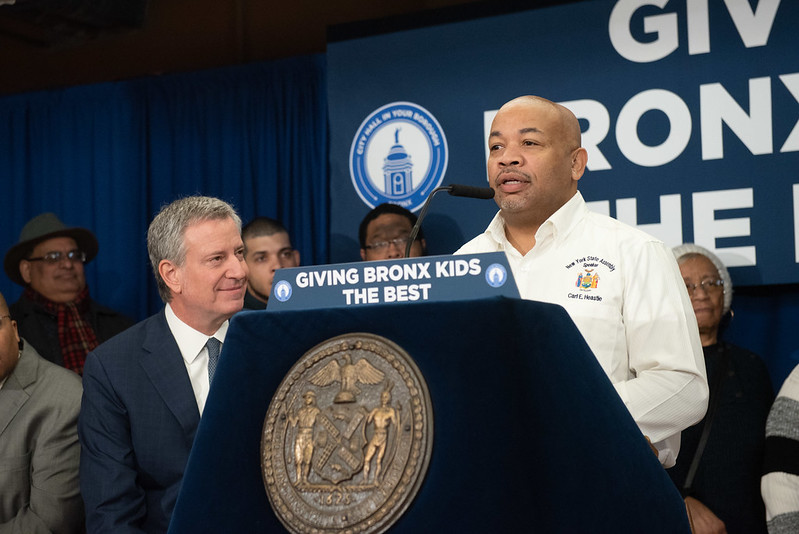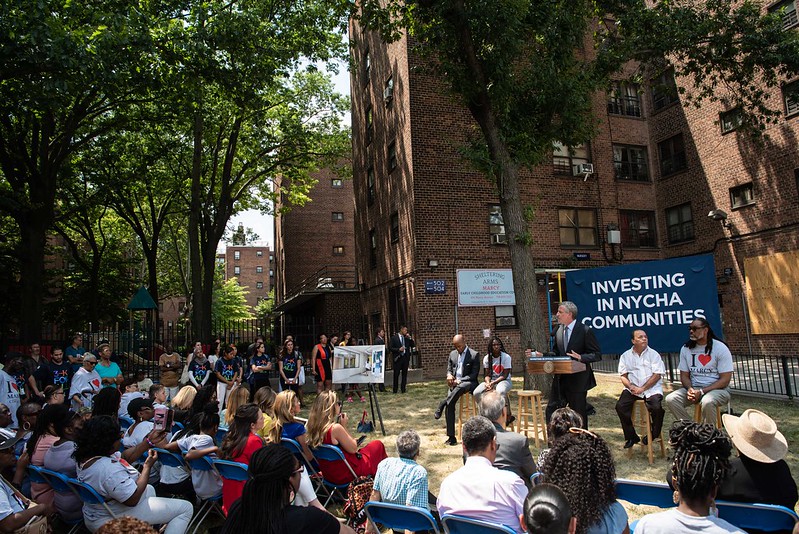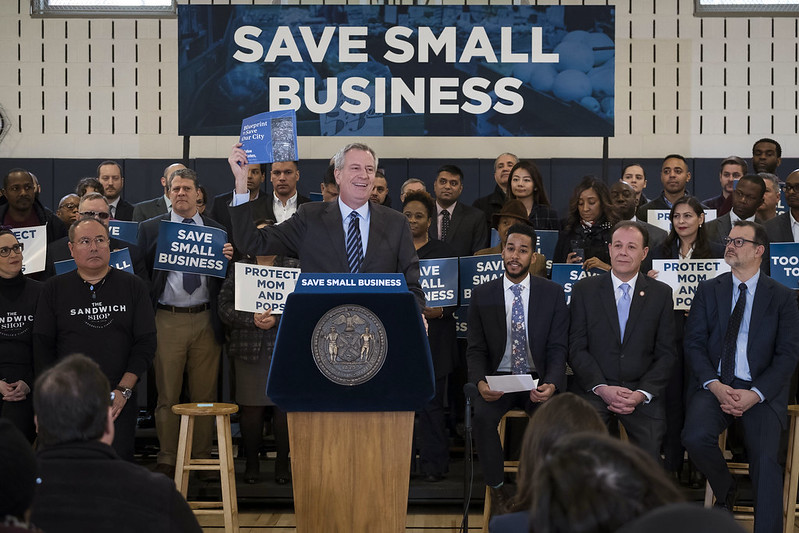Letter from a Constituent: Speaker Heastie, Please Stand Up for the Bronx

Speaker Carl Heastie (photo: Michael Appleton/Mayoral Photography Office)
I’ve lived in The Bronx all my life — and all my life, our political leaders have hung our borough out to dry.
For as long as I can remember, being from The Bronx meant going to underfunded schools, surviving in food deserts, and living in overcrowded homes or crumbling NYCHA units. None of these conditions are inevitable; rather, they’re the outcome of negligence and disinvestment by lawmakers. The people of The Bronx deserve better. Assembly Speaker Carl Heastie: to deliver justice for your neighbors in The Bronx, it’s time to end tax breaks for the rich and invest in our New York.
Over the last century, a procession of politicians have made policy decisions that actively hurt the Black and brown majority of our borough, from building the Cross Bronx Expressway straight through our communities to redlining our neighborhoods. These choices led to a generational poverty that requires intentional investment — in education, in jobs, in housing — to correct. And yet, it’s 2021, and this legacy of disinvestment is as strong as ever. Tens of thousands of Bronx residents live in failing public housing; countless others are chronically rent-burdened, on the brink of eviction, or already homeless. Our schools, which serve our majority Black and brown children, are deeply underfunded. And we suffer one of the highest rates of food insecurity in the entire country.
COVID-19 made it all worse. Over 17% of Bronx residents are currently unemployed — the highest rate in the state — even as employment rates rebound statewide. Such high joblessness is a dangerous spark, setting off disruption after disruption: hungry families, people kicked off their health insurance, families evicted from their homes, and troubling child poverty. This endless cycle is fundamentally a policy failure, not a matter of millions of low-income Bronxites failing to pull themselves up by their bootstraps. And yet, in essence our leaders continue to throw up their hands as if there’s nothing they can do.
Speaker Heastie, as a longtime constituent in your district, I’m appealing to you directly: The Bronx needs tens of billions in dollars in new revenue to end this senseless suffering. That’s the kind of investment it will take to create hundreds of thousands of well-paying jobs; to finally give our children the education they need to succeed; to stop the cycle of poverty that housing insecurity creates.
To raise the funds needed to finally invest in The Bronx, we must end tax breaks on the rich. Right now, New York’s wealthiest residents enjoy enormous, unearned tax breaks on their wealth and incomes, their luxury cars and properties, and even on the corporations they own. That’s the kind of backwards policy that lets the rich get richer while The Bronx stays poor. And this year, it’s the policy that has let billionaires accumulate over $80 billion during a global pandemic while your neighbors are still out of work.
The six bills in the Invest in Our New York Act are the clear solution. By reversing these unfair tax breaks on the richest among us, New York can finally stop balancing its state budget on the backs of Black, brown, immigrant, and working class people. By passing these bills, we can fully fund our schools, hospitals, and housing. And just as disinvestment has a negative ripple effect, investment will have a positive one. Fully funding our schools will mean more opportunities for young people in The Bronx. Accessible healthy food will mean fewer comorbidities. Functional public transport will mean Bronxites can afford to travel to good jobs anywhere in the city.
Speaker Heastie: you know as well as I do that if we fail to raise this revenue by ending tax breaks for the rich, it’ll be communities like ours in The Bronx that will suffer. Property taxes will go up for homeowners; the budgets of life-saving services — from food pantries to drug harm reduction services — will be cut; unemployment will stay high. And all the while, the systemic inequality that leads to all of this pain in the first place will go unsolved.
As a lifelong Bronxite and a dedicated community activist, I have seen a lot of injustice in my time. But over the past year, I have also been hopeful that a new day for the Bronx is around the corner. From Pelham to the South Bronx, residents from all walks of life are coming together to demand more from our elected officials. The Governor is exceptionally weak, and we have a unique moment now to deliver for The Bronx. Progressive rhetoric is not enough.
We know you, as our legislative leadership, have more power than ever. As you are about to propose the Assembly’s budget for the next fiscal year, we turn to you: pass the Invest in Our New York Act and delive r the future that the Bronx deserves.
***
Curtis Robinson is an activist and life-long resident of Assembly Speaker Carl Heastie’s district in the Bronx.
***
Have an op-ed idea or submission for Gotham Gazette? Email This email address is being protected from spambots. You need JavaScript enabled to view it.
New York City Public Housing: Grey Gardens Revisited

NYCHA (photo: Michael Appleton/Mayoral Photography)
We all know the story of deplorable living conditions and general dysfunction. Many of us were captivated by details of the wreckage and the shocking level of disrepair. We sympathized with the residents, but scratched our heads wondering what level of madness allowed such unnecessary suffering when there were ample means to alleviate it.
Although this describes the Grey Gardens of East Hampton, which became infamous in the 1970s and was depicted in films and a Broadway musical, it also describes something seemingly quite different. That is the approximately 170,000 public housing residences in New York City owned and operated by the New York City Housing Authority (NYCHA) and the official home to approximately 381,000 New Yorkers — what I call the urban Grey Gardens.
Both involve a need for massive repairs, but also the possession of sufficient resources to pay for them. While the owners of the Hamptons’ Grey Gardens, Edith Bouvier Beale and her daughter (the aunt and first cousin of Jacqueline Kennedy Onassis), may have had family wealth in the form of stocks, bonds, and other assets, NYCHA has significant wealth in the form of land in one of the most expensive real estate markets in the world.
How much land? 2,473 acres (almost four square miles). How is it using that land? Less intensively and effectively than much privately-owned land that houses wealthier New Yorkers. The Skyscraper Museum has calculated the density of various housing developments. London Terrace in the Manhattan neighborhood of Chelsea houses 931 people per acre. Manhattan House on the Upper East Side houses 478 people per acre. NYCHA houses 154 people per acre. Clearly many New Yorkers can and do live perfectly well with much greater density than currently exists in NYCHA housing.
Increasing the density of NYCHA’s developments to the average density of London Terrace and Manhattan House would add housing for over 1.3 million people. With an average household size in New York City of 2.42 people, that would translate into approximately 537,000 new apartments. It would not take much imagination to achieve this increased density by more efficiently using NYCHA properties which often include dead zones, unused open space, and surface parking lots.
How much money could the new apartments bring in? Various configurations would raise $32 billion – roughly the full estimated amount NYCHA needs to address all of its unmet capital repair and upgrade needs. For example, making half of the new apartments affordable yielding zero profit and the other half market rate yielding a profit of $120,000 each, a modest profit for a builder in New York that incurs no cost for land, would raise the full $32 billion. NYCHA, like the owners of Grey Gardens, has the assets to address all of its needs without any contribution from taxpayers or stressed government budgets.
The new housing could also be used to provide another benefit: greater diversity. NYCHA housing is by definition reserved for people with low incomes. Government officials who regularly and enthusiastically talk about diversity seem to miss the irony that the one area of housing they completely control is among the least diverse in the city. Building new residences on NYCHA owned land could bring more economic and racial diversity to neighborhoods and provide the additional benefit of helping to reduce segregation in New York City’s public schools.
The government could even go so far as to diversify individual buildings. It could provide NYCHA tenants the option, if they wanted, to move to apartments in the new buildings at their existing rents or to receive vouchers for housing of their choice elsewhere in the city paid for by the free market rents earned on their newly renovated units. Either way, no affordable units would be lost (in fact, many could be gained), buildings would be diversified and new life brought to these communities.
The problem facing NYCHA is the problem the Beales faced at Grey Gardens. It has nothing to do with a lack of resources and everything to do with shaking off years of dysfunction and complacency to take advantage of resources they already have.
***
Howard Yaruss teaches at NYU's Shack Institute of Real Estate and was formerly the General Counsel and Executive Vice President of Radian Group Inc.
***
Have an op-ed idea or submission for Gotham Gazette? Email This email address is being protected from spambots. You need JavaScript enabled to view it.
Saving Small Businesses in the Wake of COVID-19

Mayor with a small business plan (photo: Ed Reed/Mayoral Photography Office)
Ryan’s Daughter has been a staple of Yorkville since the 1970s. It’s the local neighborhood pub. There’s a pool table in the back, and the same three old regulars are always sitting at one corner of the bar. On March 15 last year, the owner of the bar made the decision to close. “When covid hit, we were really thinking first about our people,” Jim Gerding told me. “When those first reports came out, I didn’t care about the business restrictions, I cared that people were getting sick.”
In the past year, COVID-19 has had a disastrous effect on this city’s local small businesses. Businesses that were already operating on extremely thin margins have now lost most, or in some cases all, of their revenue, and have had to lay off thousands of workers. According to TrackTheRecovery.org, a research project funded by Harvard University and the Gates Foundation, there are over 40% fewer small businesses open in New York City now than there were in January 2020.
Small businesses are the lifeblood of this city — not only do they employ thousands of workers, but they provide spaces for communities to come together. We need short-term solutions for businesses dealing with the devastating effects of the COVID-19 shutdowns, but we also need longer-term solutions. Far too many small businesses were struggling long before the pandemic, and if we don’t address the root causes of their struggles, we’ll continue to see our beloved local businesses shutter.
First and foremost, we have to get direct financial relief to small businesses. Small business owners I’ve spoken to have depleted their savings and have taken out loans to keep their businesses afloat. The city should utilize federal funds to create its own grant program for small businesses, including a microbusiness assistance fund focused on minority-owned businesses.
We should implement a grant program, similar to what San Francisco’s mayor has proposed, that would provide immediate relief to help stabilize small business operations by offering grants of $5,000 to $25,000, based on the number of employees that each employer had prior to the pandemic.
Our city also needs to do more to connect small business owners with existing state and federal programs. As we saw in the first round of PPP loans, large companies were able to navigate the complex process more easily and quickly, while many smaller companies and businesses were unable to get the relief they needed. One local business owner expressed frustration that upon signing up through the city’s site, she received no help, but found herself inundated with loan offers from various institutions, which now had her contact information.
The city’s Department of Small Business Services should work directly with local community groups, such as Community Boards, BIDs, and neighborhood associations to do direct outreach to local businesses. We must also ensure that this assistance is provided in multiple languages.
Longer term, we need to address the rising costs of owning and operating a business in this city. We can begin by passing the bill (Intro. 2007-2020) sponsored by City Council Member Keith Power that would temporarily eliminate the Commercial Rent Tax for all businesses with an annual base rent of less than $1 million. According to Council Member Powers, “this bill would help approximately 5,500 Manhattan businesses...that are currently paying the tax.”
We should also work to pass the Small Business Jobs Survival Act, which would establish conditions and requirements for commercial lease renewal negotiations, including requirements for lease renewal terms, arbitration-triggering conditions, limits on security deposits, and prohibitions on landlord retaliation.
Delivery services have been critical during this pandemic, but we need to prioritize money going to small businesses and not to Silicon Valley. We need aggressive oversight of these delivery apps. Multiple lawsuits over the past several years have accused companies like GrubHub of charging hidden fees, refusing refunds, and including restaurants on their platforms without the restaurants’ permission. The state should pass the bill (S.8816), similar to a law that was recently passed in California, to require third-party delive ry services to have a valid agreement with a merchant before they advertise, promote, or sell the merchant's products on their platform.
Last year the New York City Council passed a bill that would limit delivery app fees to 15% during, and for 90 days after, a declared emergency that prohibits ordering food on premises. We should make this cap permanent.
One of the biggest complaints I hear from small business owners is that the city does a poor job of communicating, especially when it comes to ever-changing rules and regulations surrounding COVID-19. Gerding of Ryan’s Daughter explained, “as the goalpost would move back further, or the regulations would change, there was never a feeling that this is being well thought-out, from the point of view of the business.”
Last year Mayor de Blasio convened a Small Business Advisory Council, but by October, members of the Council complained that there was not a steady flow of communication from City Hall. The city must convene regular meetings of the Small Business Advisory Council. The mayor should assign a City Hall point person to address concerns from the Council, and establish inter-agency coordination so that business owners are not forced to navigate multiple agencies for guidance and support.
As we slowly recover from this terrible pandemic, we must ensure that our local small businesses are not left behind. With ever-increasing vacancies, the city must act boldly, and do more to provide resources and create opportunities for local businesses to thrive.
***
Kim Moscaritolo is a Democratic candidate for City Council in Manhattan’s 5th District. On Twitter @KimMosc.
***
Have an op-ed idea or submission for Gotham Gazette? Email This email address is being protected from spambots. You need JavaScript enabled to view it.




